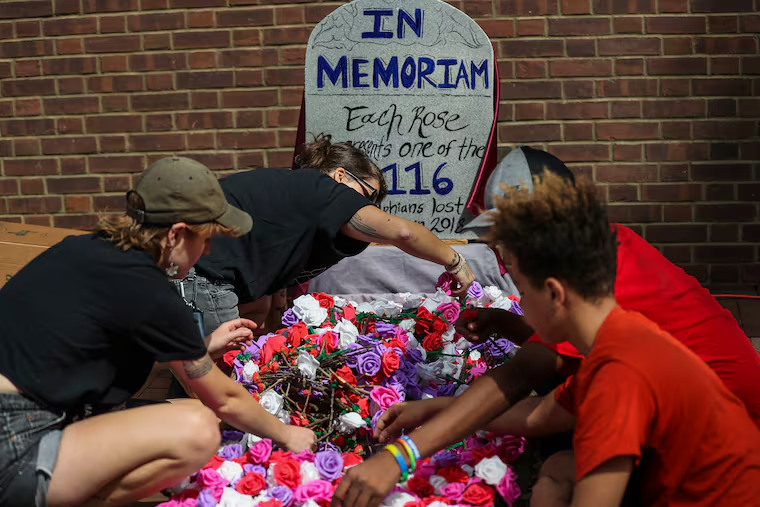Drug deaths in Philadelphia could set another record in 2021
Fatal overdoses in the first six months of 2021 rose by nearly 10% compared to the same time period last year, putting Philadelphia on track to see its highest-ever overdose death toll by year’s end.

Fatal overdoses in the first six months of 2021 rose by nearly 10% compared with the same period last year, putting Philadelphia on track to see its highest-ever overdose death toll by year’s end.
Some of the same disturbing trends noted in 2020 -- a rise in overdoses outside Kensington, the epicenter of the crisis, and a spike in overdoses among Black and Hispanic Philadelphians even as overdose deaths among white residents have decreased -- are likely still at play, city officials said.
And fentanyl, the powerful synthetic opioid that has replaced much of the heroin in Philadelphia, is turning up in overdose deaths involving other drugs, suggesting that people unused to opioids may be unknowingly ingesting drugs contaminated with fentanyl.
“Anecdotally, the epicenter is still in Kensington, but we’re seeing increased overdose deaths in other parts of the city -- West Philly, South Philly,” said James Garrow, a spokesperson for the city health department. “It’s definitely a problem that is not just a Kensington problem. It shows that we have to expand our response to the problem.”
The COVID-19 pandemic has only made the city’s existing public health problems worse, he said. “Drug overdose deaths are no different. This has been an intensely stressful two years, causing people to lose access to the supports they would have.”
Michael Hinson is president and COO of Self Inc., Philadelphia’s largest emergency housing provider and one of several organizations that received funds from the city this year aimed at combating some of the racial disparities in overdoses. He said the continued increase in overdoses makes it clear more needs to be done, especially in communities of color where drug use may not be as visible or publicly discussed.
Self Inc. has spent its $50,000 grant employing people who have experienced addiction and homelessness to distribute educational materials about harm reduction and drug use. The group has hosted online webinars and pop-up events at transportation centers, and knocked on doors to hand out information.
“They’ve carried us maybe a foot forward,” Hinson said. “It’s nowhere near what the demands of the issue actually require, and especially now that we know that these [overdose] numbers are a lot worse than what we thought they would be.”
The Philadelphia announcement came as New York City opened the first city-sanctioned supervised injection site in the country. At these sites, people can use drugs under medical supervision to prevent overdose, yet Philadelphia’s efforts to open one have been stymied. (At least one supervised injection site has been operating clandestinely somewhere in the United States since 2014.)
New York City saw its worst year of overdose deaths in 2020 -- more than 2,000 fatal overdoses, the New York Times reported, a rate of about 24 per 100,000 residents. Philadelphia’s worst year on record came in 2017, when 1,217 people died -- a rate of about 81 deaths per 100,000 residents, more than triple New York’s rate. Last year’s toll was nearly as high.
In early 2018, Mayor Jim Kenney said that he would sanction the opening of a supervised injection site but that the city would not fund it. Later that year, the nonprofit Safehouse formed to open a site and was almost immediately sued by then-U.S. Attorney Bill McSwain, who argued that the site violates a federal law known as the “crackhouse statute,” which forbids the operation of a property for the purpose of using drugs.
A U.S. District Court judge ruled in favor of Safehouse’s counterargument -- that the nonprofit’s sole purpose is to prevent overdoses -- and the organization planned to open a site in South Philadelphia in early 2020. Neighborhood opposition scuppered the plan, and then came a U.S. Court of Appeals ruling that Safehouse’s plan does violate federal law. The Supreme Court declined to hear the case earlier this year, and Safehouse representatives are returning to District Court to argue two claims that weren’t addressed in the initial District Court ruling.
A spokesperson for Kenney said in a statement that supervised injection sites “would add a powerful tool to our existing strategies,” especially as “the growing presence of fentanyl drives a concerning increase in fatal drug overdoses.”
Hinson said that as Philadelphia works toward opening a site, solving the overdose crisis will require a number of different interventions.
“This is a citywide issue that requires more collaboration, more resources, and more cooperation among the various public health infrastructures from the city to the state to the feds. And working to solve this issue with communities at the head of the table, not at the back end,” he said.
Garrow said the city is launching new efforts in communities that historically received little outreach, including installing dispensers of naloxone, the overdose-reversing drug, in South Philadelphia and West Philadelphia. The city is also doing outreach in the restaurant industry, which was rocked by a series of fentanyl overdoses among employees earlier this year.
“This is really just step one in trying to turn this into a real, citywide response, and the health department is working right now to come up with new and interesting ways to attack this problem,” Garrow said.